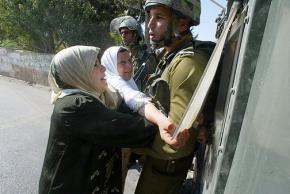A letter from Bil’in to Chicago
Administrators at Columbia College have repeatedly violated the academic freedom of Palestinian history professor Iymen Chehade, most recently by canceling a section of his class after a student complained of "bias."
What prompted the complaint of "bias" by the student? The student was offended by Chehade's screening of the Oscar-nominated 5 Broken Cameras, a documentary that offers a moving and personal account of popular resistance by residents of the West Bank village of Bil'in against Israel's construction of its apartheid wall.
When news of Columbia College's retaliation against Chehade and the campaign to defend him reached 5 Broken Cameras co-directors Emad Burnat, who is Palestinian, and Guy Davidi, who is Israeli, Davidi penned this open letter of solidarity with Chehade's efforts to defend academic freedom. On April 10, Iyad Burnat, Emad's brother and the leader of Bil'in's popular struggle, will speak at Columbia College with Chehade, Rabbi Brant Rosen and others about how and why popular struggle works--from Bil'in to Columbia College.
Dear Prof. Iymen Chehade,
I would like extend my support to you following the cancellation of your class after screening 5 Broken Cameras. I was surprised and disappointed to hear the wrongful decision to cancel the class--and on the basis of an ignorant argument demanding balance or claiming bias.
I expected more open discourse from a respected academic institution like Columbia College. There is no such thing as "balance" in a political debate--only different points of view. It is surprising how many times this basic idea needs to be repeated to people who insist on holding to the illusion of an objective truth.
In Israel, 5 Broken Cameras was recently accepted officially into the cultural program of the Ministry of Education. It has been screened in dozens of Israeli schools, despite the waves of objections.
I am stunned that an American institution takes a more radical approach in silencing different perspectives related to the Israeli-Palestinian context than the Israeli Ministry of Education. I hope more brave professors and teachers, like you, continue to bring challenging stories that give students an opportunity to think critically and confront the bias in their own worldviews.

I hope that institutions choose to support such teachers--whether they are addressing the Israeli occupation or any other challenging issue. I hope that the American educational system can hold itself to a higher standard and set an example in its ability to face challenging ideas, whether or not they are in accordance with the mainstream.
Guy Davidi


